Why Fiat’s Abarth 500E fails to deliver
Impractical, slow and wildly expensive, this European battery-powered hatch looks great but misses the mark by a sizeable margin.
You’ve got to fall in love with a micro hatch to part with $64,000.
But I couldn’t even like the electric Fiat Abarth 500E.
Fiat’s sporty hatchbacks were never about the numbers.
These tiny Italian two-doors reject cold logic like a rocket ship defying gravity to explore the stars.
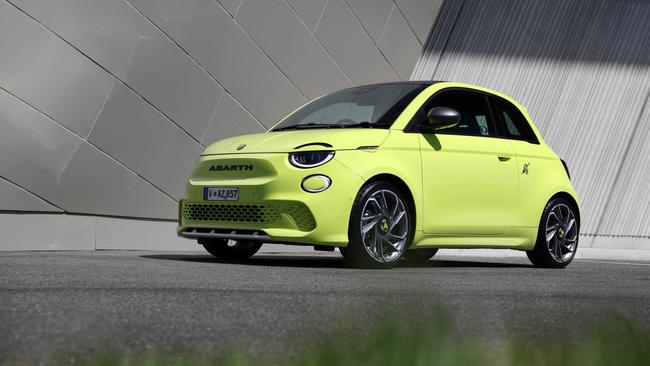
Which is absolutely the case for the Fiat 500E.
It looks sensational.
Abarth adds the right amount of attitude to the retro styling of the standard Fiat 500.
Big eyes and oversized feet lend a puppylike quality to the throwback bambino, and that could be enough for diehards prepared to pay about $64,000 drive-away for the standard Turismo model.
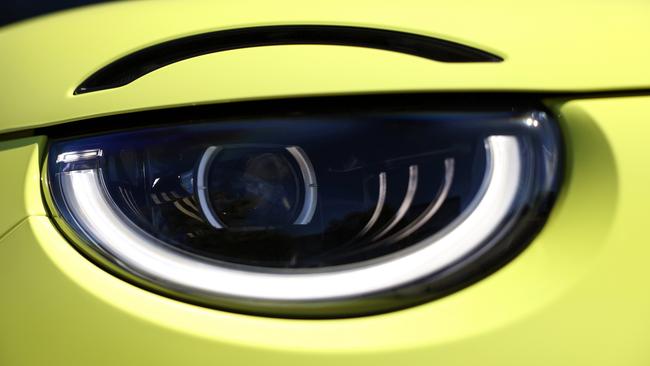
Or about $66,000 drive-away, for the limited-edition Scorpionissima.
No wonder Google translate reckons that name means “Very Scorpion” – it really stings the wallet.
The car costs significantly more than the petrol-powered Abarth 695 turbo that starts from $37,900 plus on-road costs.
Fiat carefully pitches this electro-Scorpion as “the most responsive and exciting Abarth 500 ever”, avoiding terms like “quickest”, “fastest” or “most powerful”, because the cheaper petrol model is all of those things.
The Italians claim a top speed of just 150km/h, and a sprint to 100km/h in 7.0 seconds.
Power comes from a small electric motor that sends 113.7kW and 235Nm to the front tyres.
You’re in tough territory when official papers claim fractions of a kiloWatt.
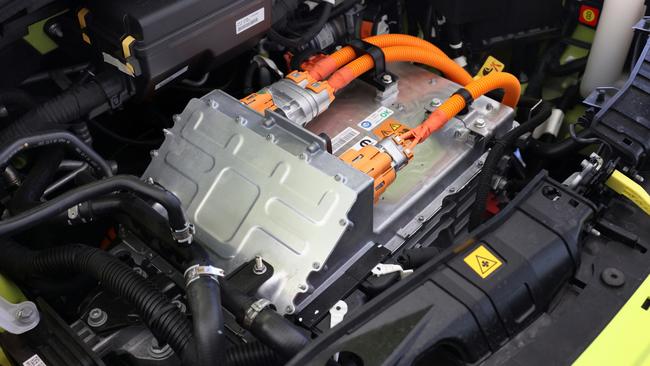
It’s like saying a car has 150 horsepower … plus the pull of an enthusiastic Labrador.
It really isn’t rapid and should not be considered a performance car.
Not in 2024. Not when similarly priced alternatives are nearly twice as quick, or drive more than twice as far.
Chinese newcomers in the MG4 X-Power and BYD Seal bring four-door practicality and more than 300kW, ripping to 100km/h in pretty much half the time for the same cash.
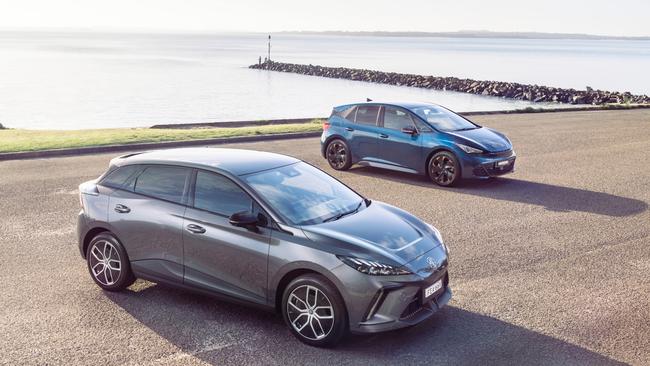
Cupra’s Born electric hot hatch undercuts Fiat’s price, matches its sprint to the highway speed limit and has 511 kilometres of electric range to double the Italian’s 253 kilometre claim.
Value isn’t a strong point for Abarth.
Sure, it has 18-inch wheels, a JBL stereo, heated seats, a digital dashboard and 10.25-inch wide-screen infotainment system with a 360-degree “Drone View” camera.
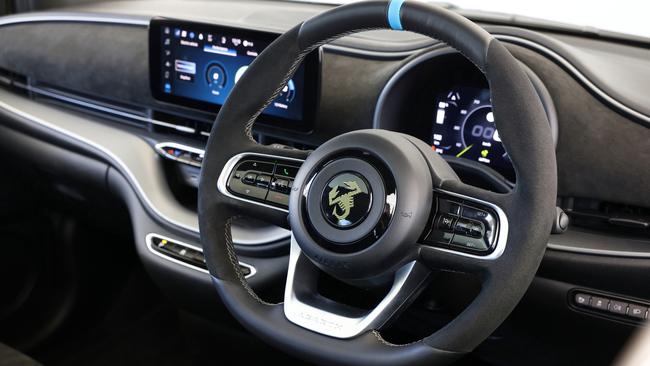
You get suede-like trim on the seats, steering wheel and dashboard, and cute design touches pay homage to its Italian roots.
But the boot is tiny, the back seat is a punchline, and some of the plastics feel quite cheap.
It also has a paltry three-year warranty that only covers the car for 150,000 kilometres of driving – most manufacturers offer five-year, unlimited-kilometre guarantees.
The Abarth’s 42kWh battery isn’t capable of ultra fast charging, so it’s best to top up at home.
Driving modes affect its energy recuperation, but not the response of its fixed suspension.
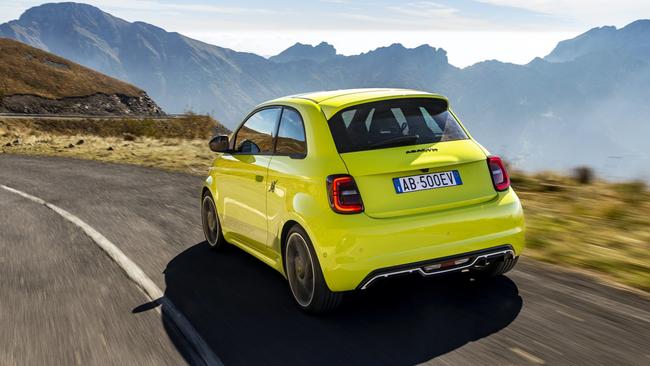
The most interesting feature is a “Sound Generator” that replicates the sound of a throaty turbo petrol engine, both inside and outside the car.
It impresses when you give it a blip in a carpark. It’s OK in the urban cut and thrust.
But it’s awful on the highway.
In Fiat’s words, the sound is “directly proportional to the speed at which the car is driven”, which translates to a droning blare through the stereo at 110km/h.
Think of it like a petrol car stuck in third gear, strained and just about bouncing off the rev limiter. You instinctively reach for a gearknob or shift paddle that isn’t there, hoping to dull the roar – or at least change its tone.
Fiat says “you can choose to turn it on or off whenever you want”.
This is not true.
The feature can only be adjusted when parked, by accessing “display” preferences buried in the menu system of the driver’s instrument readout – not the central touchscreen.
The rigmarole involved reflects Fiat’s loose relationship with logic.
Many of its foibles could be forgiven if the Abarth was a riot to drive.
But its taut suspension and low centre of gravity return a flat cornering stance with safely predictable handling, and none of the kart-like three-wheeling antics found in hot hatch greats such as the Ford Fiesta ST.
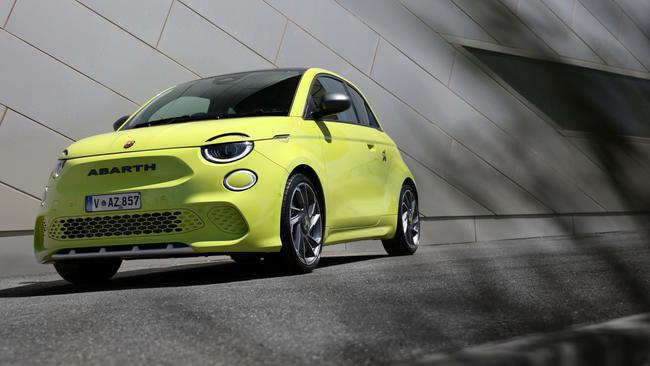
Quick steering, a taut ride and tight turning circle work well in the city.
But Abarth’s traditional charm doesn’t translate well to electric cars.
The single pedal driving experience of this 500E is a far less involving exercise than a turbo Abarth that requires both hands and feet to keep it on the boil.
If a petrol, manual Abarth is like preparing a tricky dinner with three pots on the stove, this electric version is like popping leftovers into the microwave.
VERDICT
Two stars
Cute to look at but expensive, slow and impractical, the electric “Very Scorpion” is not very good.
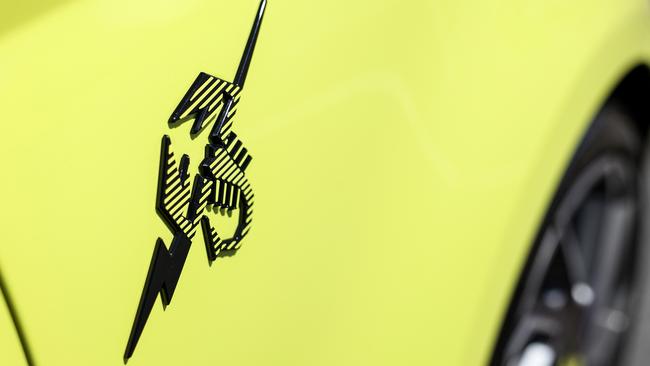
FIAT Abarth 500E
PRICE About $64,000 drive-away
MOTOR Electric, 113.7kW and 235Nm
WARRANTY/SERVICE 3-yr/150,000km, about $1500 for 5 years
SAFETY Six airbags, auto emergency braking, active cruise control, lane keep assist, blind spot monitoring
RANGE 253km
BOOT 185 litres
SPARE Repair kit
Originally published as Why Fiat’s Abarth 500E fails to deliver


